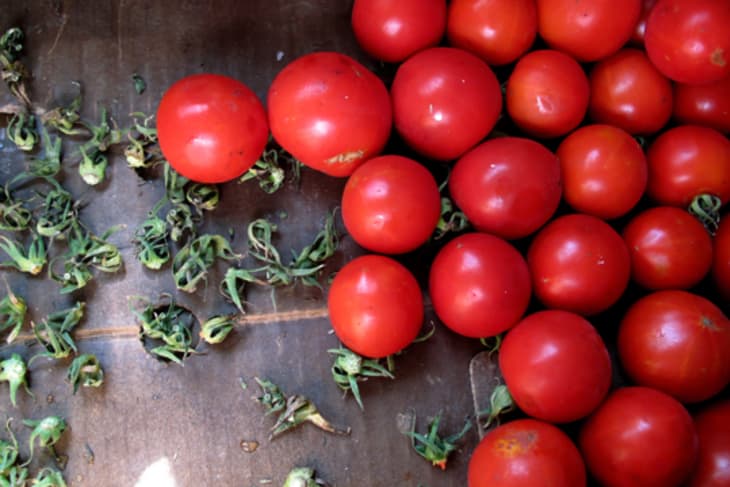What Happens When Monsanto Buys the Patent to Your Favorite Tomato
July is just around the corner and for me that means just one thing: it’s the time when the local tomato production starts to get serious and the farmers’ markets starting running red (and yellow, and pink, and chocolate, and green stripe). Sure, there’s the occasional basket of cherry tomatoes the last few weeks of June and I guess they’re pretty good. But when the dry-farmed Early Girls start showing up, that’s when then I know all is right in the world. Except, apparently, when it’s not.
First, what are dry-farmed Early Girls? Early Girl is a hybrid tomato that is prized in my region (the SF Bay Area) because it ripens early and takes well to a growing technique called dry-farming where the tomatoes are cut off from irrigation early in the season, causing the plant to stress and produce fruit that is quite sweet and concentrated in flavor. (For more on this see this post.) They are absolutely delicious, the platonic ideal of what a tomato should be. One of my favorite things in the world is when the Early Girls start showing up in the markets.
Early Girls are a hybrid and that means their genetic formula is patented. In 2005, Seminis, the seed company that owns the patent for Early Girl, was sold to Monsanto. For several years, it looks like Monsanto didn’t do much with this very small part of their huge, multi-billion dollar seed operation. But a recent post from one of the farms that usually grows Early Girl tomatoes is a warning that this may change.
Full Belly Farm farmer Judith Redmond writes with regret that they weren’t able to obtain untreated Early Girl seed from Seminis this year (untreated seed is needed to maintain their certified organic status.) This has lead to a concern that Seminis, and by extension Monsanto, is pulling back on the production of untreated Early Girl seed. Since Monsanto owns the patent, they have the power to simply make this popular, well-loved tomato disappear. Why? I don’t know. Perhaps, by comparison to the numbers they usually deal in, the untreated Early Girl seed is just too small and inefficient for them to bother. Others speculate that Monsanto is out-and-out hostile to small organic farms and no longer wishes to supply them. Redmond writes:
The possibility that Seminis would drop many of the varieties that regional farmers depend on was predicted by plant breeders and seed brokers ever since the news of the Monsanto purchase, and unfortunately, those fears seem to be coming true. In addition, many experts in the seed industry expect to see Monsanto slowly start building the market for genetically engineered fruits and vegetables. As Rob Johnston, of Johnny’s Selected Seeds (one of Full Belly’s favorite seed sources, unusual in that they still maintain an in-house breeding program) said, “I worry about the future of the Seminis breeding programs and that Monsanto will curtail creative directions and focus on a biotech agenda.”
I am of course aware of the controversies around Monsanto, GMOs, and seed diversity as well as the issues with owning patents for seeds and I have many opinions about this situation (which is a whole other post). What was quite striking to me in the case with the Early Girls was how personal it felt. Dry-farmed Early Girls are an extremely popular tomato in the Bay Area. They taste delicious, they are sustainable to grow, everybody loves them. I was not exaggerating when I said that when I see Early Girls in the markets I feel all is well in the world. Beyond the simple fact of filling my belly and providing me with nutrition, Early Girls are a representation of one of my most fundamental values: delicious, safe, affordable, local, sustainable food.
The situation with Full Belly is a reminder that they could just disappear for no other reason than a very large company is no longer interested in offering their seed. This points to something much larger than a Bay Area foodie whining about not being able to get her favorite tomato: the danger of one company owning and therefore controlling, the genetic diversity of our food.
I googled around and it looks like some of the other small organic farms that ring my region have managed to plant Early Girls this year, so we won’t be completely bereft, at least so far. But as Redmond says in the final paragraph of her post:
While there may not be immediate replacements for many of the vegetable varieties now owned by Monsanto the experience of this year made us reflect on the need to move our business away from Monsanto varieties, to the extent that it is possible. Regardless of one’s feelings about genetically engineered seeds, the stories of the Early Girl tomato and the Ambrosia melon offer a history worth tracing in the continuing trend of food industry consolidation, a lesson that should give everyone pause as we consider the future of seeds.
→ Read the full post: Where Have All the Early Girls Gone? at Capay Valley Farm Shop’s FarmNews
Don’t it always seem to go …
Update: I’ve just discovered that the article I referenced above is a few years old (it was reposted on the Capay Valley site with no date) and that Johnny’s Selected Seeds and other sources have a good supply of untreated Early Girl seed. Nonetheless, the larger issue around the patenting and availability of seeds remains relevant and worthy of our attention.
(Image: Dana Velden)
